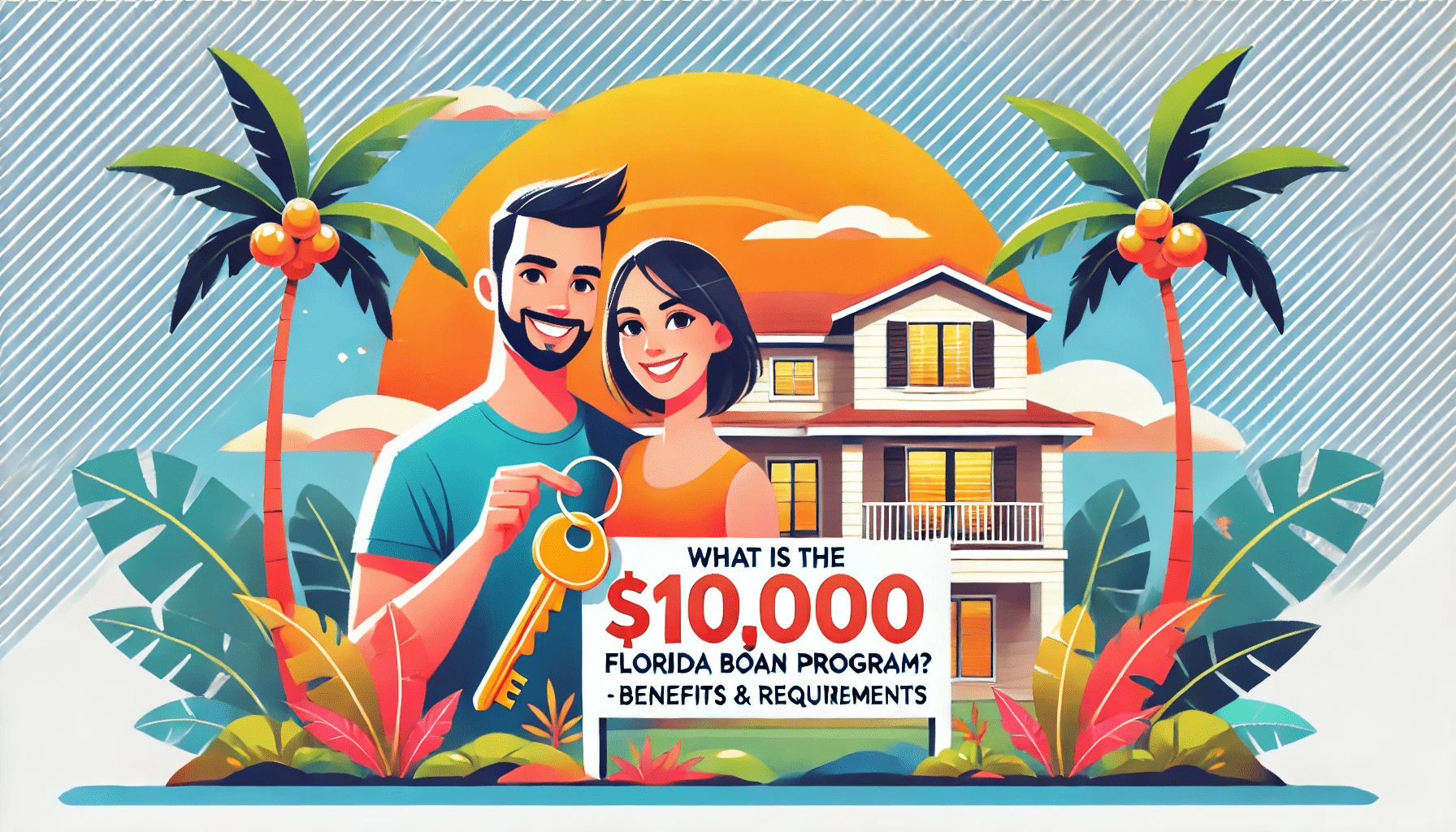What is the $10,000 Florida Bond Loan Program? | Benefits & Requirements
Are you a first-time homebuyer looking for help with your down payment or closing costs?
The $10,000 Florida Bond Loan Program from Florida Housing is here to make homeownership more affordable by offering financial assistance and low-interest loans.
It's one of 26 programs available to first-time homebuyers in the state of Florida.
Check Your Eligibility for the Florida Bond Loan Program
In this guide, you’ll learn everything you need to know about the program’s benefits, requirements, and how to apply.
In this article (Skip to...)

Florida Bond Loan Program Overview
The Florida Housing Bond Loan Program is a great way to help you buy your first home. It offers low-interest loans and assistance for down payments and closing costs.
You can choose from different loan options like FHA, VA, USDA, or conventional loans with lower mortgage insurance.
There are two types of assistance: a no-interest loan you can pay later or a low-interest loan with monthly payments.
The program is for primary homes, and you only need to meet simple rules like income and price limits. If you’re a veteran or buying in a special area, you don’t even need to be a first-time buyer.
Check Your Eligibility for the Florida Bond Loan Program
Option 1: No-Interest Deferred Loan
- Down payment assistance amount: $10,000.
- Interest rate: 0%.
- Monthly payments: None.
- Repayment only due when you sell your home, refinance, pay off your mortgage, or if the home is no longer your primary residence.
Option 2: Low-Interest Second Mortgage
- Down payment assistance amount: $10,000.
- Interest rate: 3% (fixed).
- Term: 15 years.
- Monthly payments required.
Check Your Eligibility for the Florida Bond Loan Program
Florida Bond Loan Benefits
- Low-interest rates: Fixed 30-year loans for lower monthly payments (save hundreds to thousands annually depending on loan amount).
- Down payment assistance: $10,000 as a no-interest deferred loan or low-interest loan (no upfront costs).
- Reduced mortgage insurance: Lower premiums for eligible conventional loans (save $500–$1,200 per year).
- Flexible eligibility: Assistance for primary residences across Florida.
- Exemptions: Veterans and targeted area buyers don’t need to be first-time homebuyers.
Check Your Eligibility for the Florida Bond Loan Program
How the Florida Bond Loan Program Works
First, you work with a participating lender like MakeFloridaYourHome to check if you qualify and to start the assistance application process.
Next, you complete an approved homebuyer education course, either online or in-person, to learn about the responsibilities of homeownership.
Then, your lender will help you choose the best loan option for your needs and confirm the amount of assistance you qualify for.
After that, the down payment assistance is applied at closing, either as a no-interest deferred loan or a low-interest loan with monthly payments.
Once you close on your home, you can enjoy the benefits of affordable monthly payments and focus on making your house a home.
Check Your Eligibility for the Florida Bond Loan Program
Requirements & Eligibility
First-Time Homebuyer Requirement
You must be a first-time homebuyer unless you're a veteran or purchasing in a federally designated targeted area.
A first-time homebuyer means you haven’t owned a primary residence in the last three years.
Income Limits
Your household income must not exceed the program's limits, which vary by county and household size.
Purchase Price Limits
The home's purchase price must be within the program's limits for your area.
Primary Residence
The home must be your primary residence; investment or vacation properties are not eligible.
Homebuyer Education
At least one borrower must complete an approved homebuyer education course before closing.
Loan Type
You must qualify for an eligible loan type:
- FHA Loan: Backed by the Federal Housing Administration, ideal for buyers with lower credit scores.
- VA Loan: Available to eligible veterans, active-duty service members, and their families, with no down payment required.
- USDA Loan: Designed for rural homebuyers with low to moderate incomes, offering no down payment.
- Conventional Loan: Includes options like HFA Preferred or HFA Advantage with reduced mortgage insurance for qualified borrowers.
Other Requirements
Non-purchasing spouses and co-signers must also meet certain program rules.
You must meet the minimum credit score and debt-to-income ratio guidelines set by the program.
Check Your Eligibility for the Florida Bond Loan Program
FAQ: Florida Bond Loan Program
1. What is the Florida Bond Loan Program?
The program helps first-time homebuyers by offering low-interest loans and $10,000 in down payment assistance to make homeownership more affordable.
2. Who qualifies for this program?
First-time homebuyers, veterans, or buyers in federally designated targeted areas who meet income, purchase price, and other eligibility requirements.
3. What are the down payment assistance options?
You can choose between a $10,000 no-interest deferred loan (no monthly payments) or a $10,000 low-interest loan with monthly payments over 15 years.
4. Do I need to take a homebuyer education course?
Yes, at least one borrower must complete an approved homebuyer education course before closing.
5. Can I use this program to buy any home?
The home must be your primary residence and meet the program’s purchase price limits.
6. Are there any exemptions to the first-time homebuyer rule?
Yes, veterans and buyers purchasing in federally designated targeted areas are exempt from the first-time homebuyer requirement.
Check Your Eligibility for the Florida Bond Loan Program
Next Steps
The first step is to verify your eligibility for the $10,000 Florida Bond Loan Program online. This quick check will confirm if the program is available in your area and if you meet the basic requirements.
Once verified, contact a participating lender who will guide you through the application process, help you choose the best loan option, and confirm your down payment assistance amount.
After your financing is approved and your homebuyer education course is completed, your down payment assistance will be applied at closing to reduce your upfront costs.
Start now by verifying your eligibility online!
With over 50 years of mortgage industry experience, we are here to help you achieve the American dream of owning a home. We strive to provide the best education before, during, and after you buy a home. Our advice is based on experience with Phil Ganz and Team closing over One billion dollars and helping countless families.

About Author - Phil Ganz
Phil Ganz has over 20+ years of experience in the residential financing space. With over a billion dollars of funded loans, Phil helps homebuyers configure the perfect mortgage plan. Whether it's your first home, a complex multiple-property purchase, or anything in between, Phil has the experience to help you achieve your goals.


 By
By  Edited by
Edited by 




